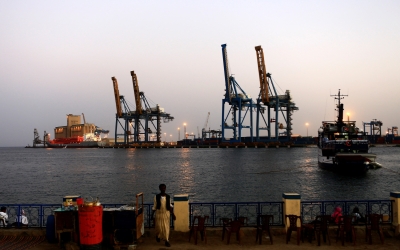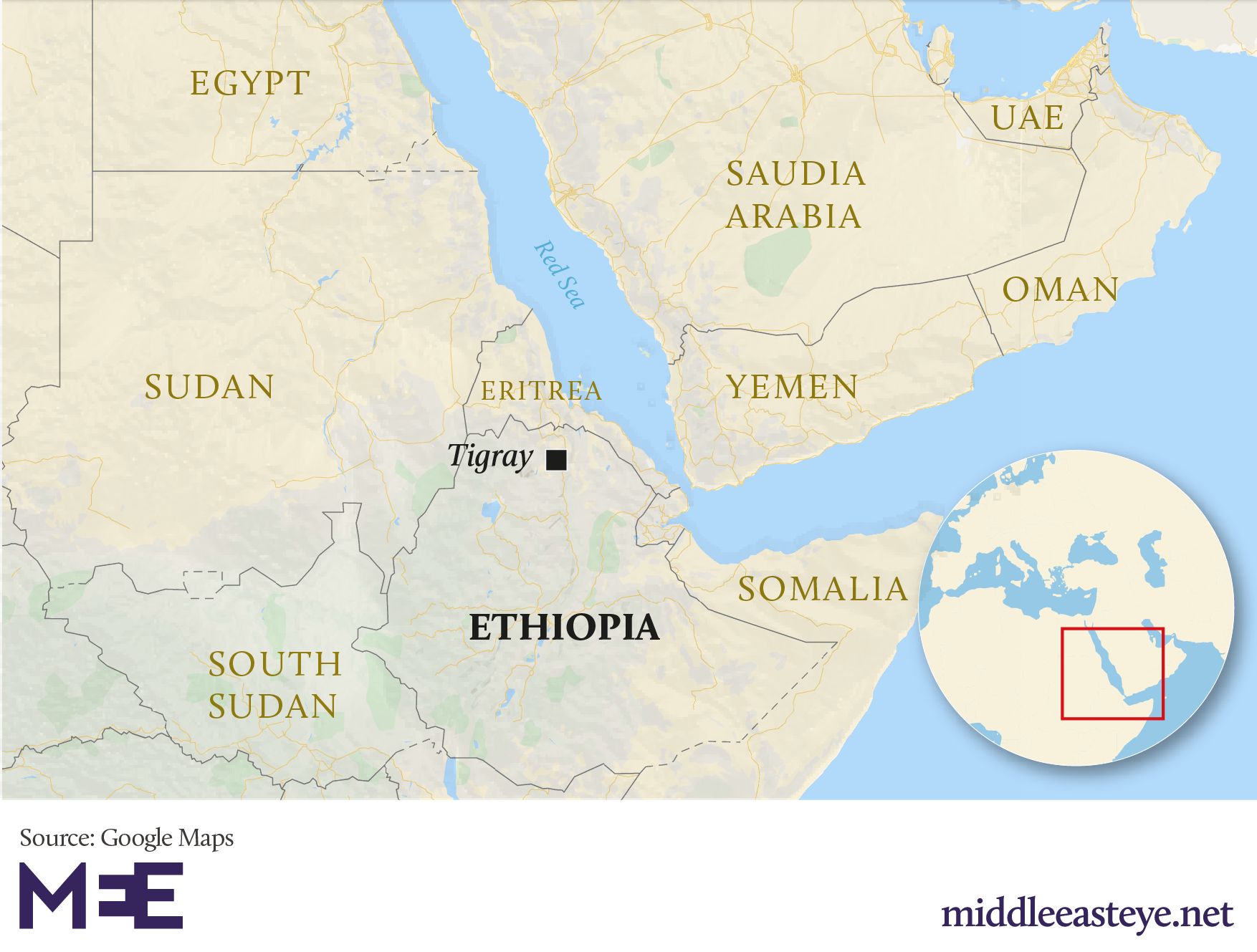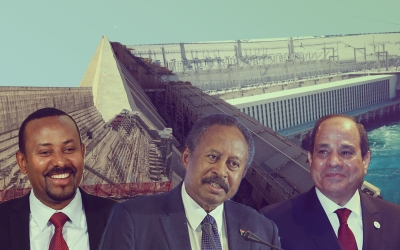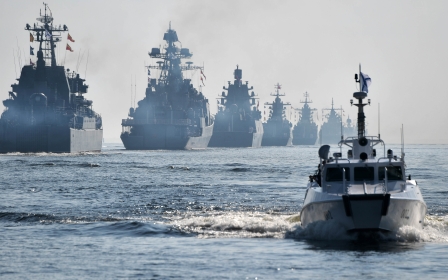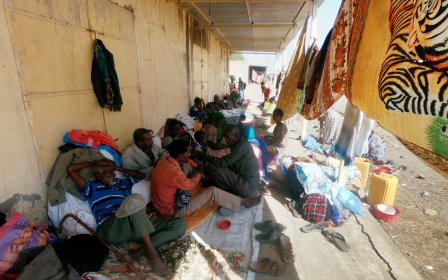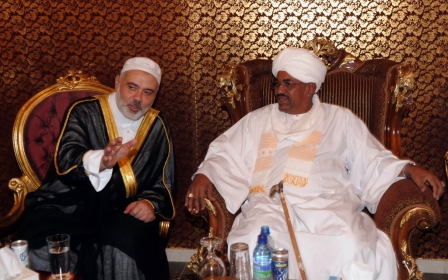New regional tensions threaten Sudan's fragile democratic transition
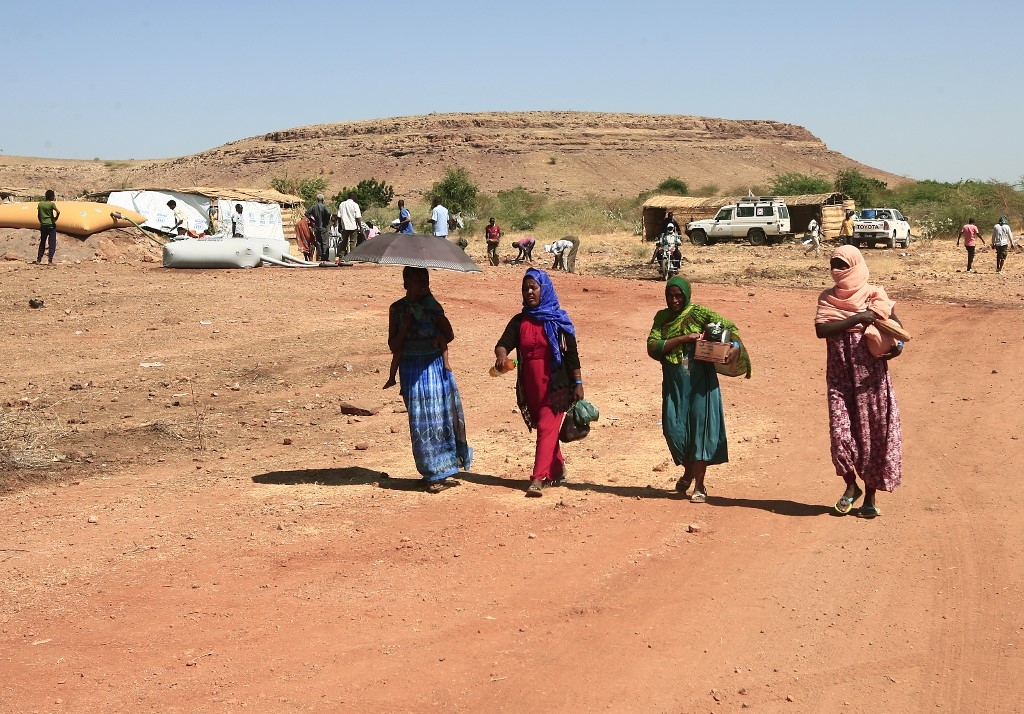
A new conflict on Sudan's eastern borders is threatening the country's hybrid military-civilian leadership with deepened internal disputes and more foreign intervention in an already fragile democratic transition.
Sudan is ruled by a technocratic government under a military-civilian ruling body known as the Sovereignty Council, which is leading the transition into democratic civilian government in 2022.
After nationwide protests against his 30-year rule, president Omar al-Bashir was overthrown in April 2019 by the military and was replaced by the Transitional Military Council (TMC).
Further protests demanding an end to military rule, and a massacre that left more than 100 protesters dead in Khartoum, led to an agreement on 5 July 2019 between the TMC and a civilian alliance, the Forces of Freedom and Change (FFC), on a 39-month transition process.
'Sudan is under intelligence polarisation from the UAE and Saudi Arabia from one side and Qatar and Turkey on the other. There is also another tension between Egypt and Ethiopia, who use Sudan in a proxy war against each other'
- Sudanese security expert
Regional actors, meanwhile, are exploiting civil-military rifts in Sudan to impose their own agendas, according to several observers.
The current splits and political uncertainty in the country have prompted attempts by regional and big-power intelligence agencies to turn Sudan into a hub for their counterterror and other intelligence efforts, a senior security expert with close links to the transitional government said.
"Sudan is under intelligence polarisation from the UAE [and] Saudi Arabia on one side and Qatar and Turkey on the other. There is also another tension between Egypt and Ethiopia, who use Sudan in a proxy war against each other," he told Middle East Eye.
He added that Sudan is already the target of aggressive international meddling because of the conflict of interests of regional axes, with competition between United States and EU on one side and China and Russia on the other.
More locally, the camp of Saudi Arabia and the United Arab Emirates (UAE) want Sudan to be on their side regarding the rift among Gulf states while also seeking to decrease the influence of Qatar and Turkey in Sudan that the Sudanese transitional government inherited from Bashir's era, he said.
Additionally, Sudan, which has borders with Egypt and Ethiopia, is used by both countries to serve their respective political and economic agendas.
Former US diplomat and Atlantic Council senior fellow Cameron Hudson said that Sudan is struggling to maintain its independence regarding its regional stances as powerful states are putting pressure on its new government.
"Sudan has been struggling for some time to manage its external relations with larger and more powerful states, who all have an interest in the ultimate political outcome in Sudan," he told MEE.
"We see this with UAE helping to push the Israel [normalisation] deal. We see this in Egypt pushing its views on the Renaissance Dam talks," said Hudson, who is also the former chief of staff at the office of the US special envoy to Sudan at the US State Department.
Ethiopia, Sudan and Egypt have been locked in a bitter dispute over the filling and operation of the Grand Ethiopian Renaissance Dam (GERD), which remains unresolved although the reservoir behind the dam began filling in July.
Talks have so far stalled, with Egypt and Sudan insisting that binding agreements are needed to secure their future interests and water security, and must be agreed prior to the filling process.
Hopes for stability dashed
Meanwhile, Sudan's controversial deal to normalise ties with Israel, following in the footsteps of its Gulf allies the UAE and Bahrain, created huge splits among the country's political class and its people.
It was also perceived to be partly a result of foreign pressure from the UAE and the US, taking advantage of Sudan's desperate need for financial aid and opening up trade opportunities in the midst of political upheaval, the Covid-19 pandemic, and an economic crisis that has taken a toll on millions of people.
With the normalisation deal with a key Washington ally and the US decision to remove Sudan from the State Sponsors of Terrorism List, transitional rulers have been hoping for more stability and improved economic conditions.
Yet, a nascent conflict in Ethiopia's Tigray region, bordering the already restive Eastern Sudan, has opened up a new front of tension for the country. Sudanese officials expect up to 200,000 refugees to flee the conflict into Sudan.
Eastern Sudan itself has been recently rocked by widespread protests, with demonstrators last month disrupting the country's largest port and calling for independence from Khartoum, as indigenous tribes objected to a government-brokered peace deal which they say excluded their voice.
Sudanese political analyst Abdul Galil Suleiman warned that the Tigray fighting is not just threatening Sudan but the entire region, including Ethiopia, Eritrea and Eastern Sudan.
"The fighting is taking place in the strategic city of Humra, which is located in the middle of the borders between Ethiopia, Sudan and Eritrea,” he told MEE.
"The main tribes of Tigray are actually living in the three countries, so this war is already regional if we look at the demography of the region, but also politically it is connected to the interests of the three countries and beyond," he added.
The conflict is also seen as having the potential to threaten the stability of the entire Horn of Africa.
Military-civilian rivalry
Monitors also warn that Sudan is at a crossroads partly due to continuous disputes between the civilian and military components of the transitional government.
According to the constitutional declaration that regulates the transitional period, the government shall be led by a TMC member for the first 21 months and a civilian member of the Sovereignty Council for the following 18 months. The present chairman of the council is General Abdel Fattah al-Burhan.
Former US diplomat Hudson said that with the Sudanese military head leading the transitional period, that has influenced the diplomacy, politics and other dynamics in the region.
He warned that the current fighting in Ethiopia's Tigray region has the potential to have a significant impact on Sudan's political dynamics.
'In all cases, we see Burhan playing a more decisive role than civilian leaders. He is leading diplomatic efforts, security talks and now directing the military to close borders'
- Cameron Hudson, former US diplomat
"We now see a potential crisis in neighbouring Ethiopia with the potential to seriously exacerbate ongoing instability in Sudan's eastern regions," he told MEE.
"In all cases, we see [Sovereignty Council chairman] Burhan playing a more decisive role than civilian leaders. He is leading diplomatic efforts, security talks, and now directing the military to close borders," he added, arguing that the civilian leadership is now facing a hard test.
The constitution further stipulates that the civilian council of ministers is tasked with the entire executive management of the country, including the economy, running the public sector, foreign relations and peace talks with rebels.
In practice, however, the military is playing a wider role beyond that mandate, reflecting a power struggle between the military and civilian elements of the government.
For example, the military component in the transitional government is leading the peace process with rebel elements. The deputy chairman of the Sovereignty Council, the paramilitary Rapid Support Forces leader Mohamed Hamdan Daglo - better known as Hemeti - is serving both as the leader of the government's delegation in the Juba peace talks with some rebel groups and as the chairman of the economic committee in charge of managing the economy along with the Ministry of Finance.
Such military intervention in civilian domains has been one of the key reasons for disputes between the military TMC and the civilian FFC, which accuses the military of violating the constitutional declaration by taking a leading role in the economy and in the peace talks.
The military is also in charge of the security sector, including appointing the ministers of defence and interior, with full control over the army and police.
Talks on Ethiopia's Renaissance Dam, which will affect water flowing into Sudan and on into Egypt, are led on the other hand by the civilian Ministry of Irrigation and Water resources.
Prime Minister Abdallah Hamdok, a former administrator and diplomat, is serving as the chairperson of the Djibouti-based Intergovernmental Authority on Development (IGAD), an eight-country trade bloc in Africa, including governments from the Horn of Africa, Nile Valley and the African Great Lakes.
Hudson believes that position gives Hamdok an edge.
"As chairman of IGAD, Hamdok now has an opportunity to apply civilian authority and influence to events in Ethiopia and on its own borders. This is critical if Sudan is going to demonstrate to itself and the broader region that civilian leadership is able to manage complex security challenges,” Hudson said.
Egypt supporting Burhan
Relations with Egypt constitute another sphere of influence by a regional power.
Egyptian President Abdel Fattah el-Sisi, a former military general, has backed the transitional military rulers in Sudan since Bashir's overthrow.
Both TMC head Burhan and deputy head Hemeti reportedly met with Sisi and his intelligence chief, Abbas Kamel, several times over the past year to discuss bilateral ties and issues, particularly the Renaissance Dam.
According to two Sudanese sources, Egyptian and Sudanese generals are aiming to put pressure on Ethiopia, which supports the civilian component led by Prime Minister Hamdok, to influence the dam talks.
"There is a strong hidden rift among the military and civilians in Sudan over the conflicts in Ethiopia and the alleged intervention of Egypt and Eritrea in the tension in Tigray recently," the sources, who asked for anonymity because they are not authorised to talk to the media, told MEE.
"It is clear that Egypt is supporting Burhan while Ethiopia is backing Hamdok, but that is also motivated by other interests of Ethiopia and Egypt in Sudan, and the conflict over the dam, as both countries want Sudan on their side of the talks," one source said.
Middle East Eye propose une couverture et une analyse indépendantes et incomparables du Moyen-Orient, de l’Afrique du Nord et d’autres régions du monde. Pour en savoir plus sur la reprise de ce contenu et les frais qui s’appliquent, veuillez remplir ce formulaire [en anglais]. Pour en savoir plus sur MEE, cliquez ici [en anglais].


